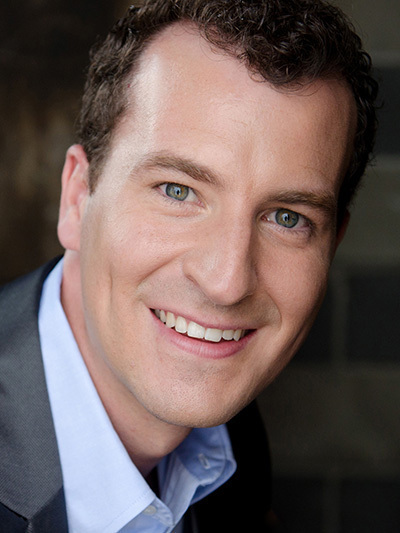Grammy Awards spotlight Notre Dame music faculty
At the 66th Grammy Awards on Sunday (Feb. 4), two faculty members in the University of Notre Dame’s Department of Music will wait to hear if their project names are called.
Daniel Schlosberg, a professor of the practice for piano, is a nominee for best classical solo vocal album, and Stephen Lancaster, an associate professor of the practice for voice, is part of an ensemble nominated for best choral performance.

The event will be a homecoming for Los Angeles native Schlosberg — who is being recognized for his work as a pianist on “40@40,” an art-song collaboration with soprano Laura Strickling. The album is the first installment of 20 pieces of a 40-song vision featuring the work of composers who are diverse in age, background and location.
“The idea was to have a lot of different voices to foster this sense of community that Laura and I both feel is essential to the genre,” said Schlosberg, who is also director of undergraduate studies for the department.
Schlosberg concentrates his research on art song, which he describes as “two artistic mediums coming together to create this hybrid form that is greater than the sum of its parts.” The genre combines poetry and musical composition to create new interpretations of both works.
He also focuses on instrumental contemporary music that is non-vocal and plays chamber music with various performers such as the Chicago Symphony Orchestra.
Schlosberg started playing piano at age 4 and describes the role of music throughout his life as “a very heightened experience.”
“It’s a way of commenting on the way we’re feeling, what’s going on in society, and many, many things,” he said. “It expresses ideas and emotions that are hard to express, complicated, or abstract.”
When he performs, he hopes audience members are emotionally provoked.
“In particular with the art-song genre — text and music — I want them to see how composers navigate and interpret the text they’ve been working with and the subtlety and intricacy that is involved,” Schlosberg said. “And I want them to be excited about art song and explore it further with other artists, composers and time periods.”

When the gilded gramophones are handed out on Feb. 4, Lancaster will be anxiously awaiting the announcement of the best choral performance award. Conductor Craig Hella Johnson is nominated for the album “House of Belonging,” performed by the large vocal ensemble Conspirare, which Lancaster joined in 2020.
The vocal ensemble won a Grammy in 2015 and has been nominated 11 times. For this album, the group rehearsed for several days and performed a live concert before making the recording.
“The more we rehearsed it, the more we loved the repertoire. And then the recording process went really well,” Lancaster said. “So, I think we all felt a sense of excitement that this was a satisfying project with music we felt strongly about. The music and poetry convey powerful messages about belonging that are meaningful to people today.”
Lancaster, who is a fellow with the Nanovic Institute for European Studies, performs both as a soloist and as part of ensembles, primarily focusing on Western classical contemporary and sacred music.
Other notable Notre Dame connections to the Grammy Awards include music faculty member Alexander Blachly, whose vocal group Pomerium was nominated for best small ensemble performance in 1999; Folk Choir director J.J. Wright, whose album “The Caribbean Jazz Project, Afro-Bop Alliance” won a Latin Grammy for best Latin jazz album in 2008; and Sacred Music at Notre Dame technology and production coordinator Daniel Stein, who was a principal player in the album “Canto América,” which was nominated for best Latin jazz album in 2017.
“It’s a major distinction for the department to receive this recognition,” said Berthold Hoeckner, the Keough-Hesburgh Professor of Music History and department chair. “As a department, we are committed to supporting and fostering creative work. These honors speak to the manner in which our faculty are leading the way in innovative and groundbreaking programming.”
Originally published by at al.nd.edu.
Latest Colleges & Schools
- ‘Prebunking’ false election claims may boost trust in electionsIn recent years, democracies worldwide have seen a growing erosion of trust in election outcomes and institutions, driven in part by fears of widespread fraud. New Notre Dame research finds that “prebunking” — providing accurate information before false claims spread — boosts trust in elections more effectively than traditional fact-checking.
- Justice Amy Coney Barrett to deliver Center for Citizenship and Constitutional Government lectureAmy Coney Barrett, associate justice of the Supreme Court of the United States, will speak at the University of Notre Dame at 4 p.m. Sept. 12 in the Leighton Concert Hall of the DeBartolo Performing Arts Center.
- Three Notre Dame researchers win NEH grants for humanities-based projectsDavid Hernandez, the Eli J. and Helen Shaheen Associate Professor of Classics, and Morgan Munsen, senior research and partnerships program manager at the Nanovic Institute for European Studies in the Keough School of Global Affairs, have each won an NEH Collaborative Research grant. Thomas A. Stapleford, associate professor in the Program of Liberal Studies, is leading a team that has been awarded a Humanities Research Center on Artificial Intelligence grant.
- Open-access database offers insights into U.S. congressional candidatesEach election cycle, thousands of candidates vie for seats in the U.S. House of Representatives and the Senate. Until now, there has been no comprehensive, publicly available resource cataloging what those candidates say about who they are or what they stand for. A new open-access database called CampaignView, created by researchers at the University of Notre Dame, offers researchers, journalists and educators a powerful tool to understand congressional elections.
- First impressions count: How babies are talked about during ultrasounds impacts parent perceptions, caregiving relationshipPsychologist Kaylin Hill studied the impact of a parent’s first impression of their baby during an ultrasound exam. The words used by the medical professional to describe the baby (positive or negative) influence how the parents perceive their baby, relate to them after they're born and even how that child behaves as a toddler. The research has broad implications for how we train medical professionals to interact with expectant parents, as well as how we care for parents during the perinatal period when they are most susceptible to depression.
- Prioritizing prenatal care may decrease low birth weight outcomes in The Gambia, Notre Dame research findsA new study co-authored by University of Notre Dame researchers highlights the importance of prenatal care for improving the health of mothers and newborns, providing evidence that can inform policy.













